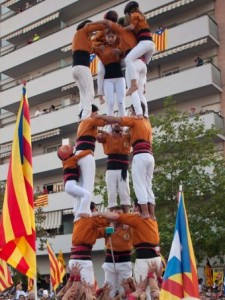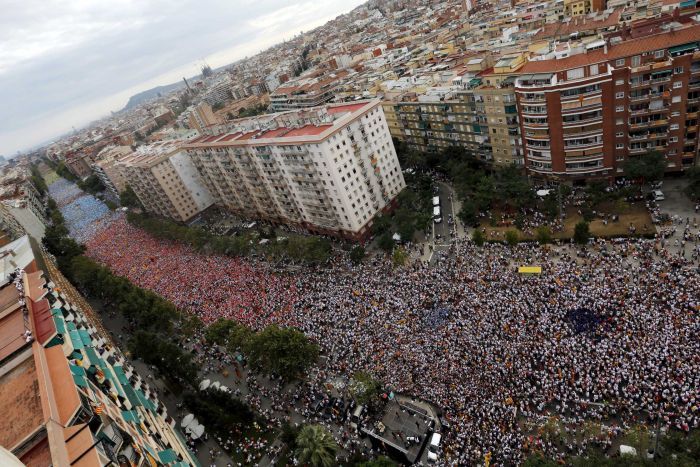12.09.2015 - 12:21
Waving red and yellow Catalan flags, they marched down a major road into the city, yelling “Independence!” while some formed human pyramids — a Catalan folk tradition.
The demonstration took place on Catalan national day at a time of high political tension, with police and the central government giving very different turnout figures.
 City police said 1.4 million people had joined the march through the beachfront city, capital of the Catalonia region, which has 7.5 million inhabitants.
City police said 1.4 million people had joined the march through the beachfront city, capital of the Catalonia region, which has 7.5 million inhabitants.
But Spain’s central government put the turnout at just over half a million, saying between 520,000 and 550,000 people took part.
The show of force comes just three months ahead of a general election in Spain, the eurozone’s fourth-biggest economy.
Polls this week showed pro-secession candidates could win a majority of seats in the Catalan parliament when the region votes on September 27.
If they win, Catalan president Artur Mas has vowed to push through an 18-month roadmap to secession for the region, which accounts for a fifth of Spain’s economy.
“Once the people have spoken through their vote, we will all take on board what the majority decides,” Mr Mas said.
Catalans divided on independence
Spain’s conservative prime minister Mariano Rajoy fiercely opposes independence and a plebiscite. He says all Spaniards reserve the right to vote on issues of sovereignty.
“We have been waiting for it for centuries and I believe the moment has come,” Mr Batlle said.
 PHOTO: Catalans took to the streets waving flags and chanting “Independence!”. (Reuters/Gustau Nacarino)
PHOTO: Catalans took to the streets waving flags and chanting “Independence!”. (Reuters/Gustau Nacarino)Mr Mas, a conservative who is campaigning in an alliance with left-wing nationalists, is portraying this month’s election as a de facto vote on independence, like the one in Scotland last year, and in Canada’s French-speaking province of Quebec in 1980 and 1995.
Those votes all resulted in a ‘No’ to secession.
“We would have preferred a referendum like in Quebec and Scotland, but the only course left to us was to organise these elections,” Mr Mas said.
“No matter how much they tell us we cannot leave, we will push ahead,” demonstrator Vida Domenech said.
“We cannot let ourselves be the only region that pays so much and receives so little.”
New left-wing anti-austerity party Podemos favours a referendum while the main opposition Socialists promise a constitutional federal reform which would grant Catalonia more powers.
Mr Rajoy refuses to negotiate on independence and has not publicly discussed possible constitutional reforms.
Deputy prime minister Soraya Saenz de Santamaria accused Mr Mas of turning the traditional Catalan national day into an “electoral event”.
British prime minister David Cameron warned last week that Catalonia would drop out of the European Union if it seceded from Spain.
Mr Mas has disputed that and said on Friday that the prospect of creating a new state in Europe was nothing new.
“Thirteen countries have joined the EU in little more than a decade. Of those, seven were not independent states 25 years ago,” he said.
The political division also showed itself on the street, with some Catalans insisting that the separatists did not speak for them.
“I am fed up of this business,” said Joan Madorell, a 51-year-old architect in Barcelona.
But 91-year-old Joaquim Batlle, who spent time in jail for his defence of Catalan nationalism during the dictatorship of General Francisco Franco which tried to suppress Catalan identity, said he was looking forward to independence with special enthusiasm.
“We have been waiting for it for centuries and I believe the moment has come,” Mr Batlle said.

